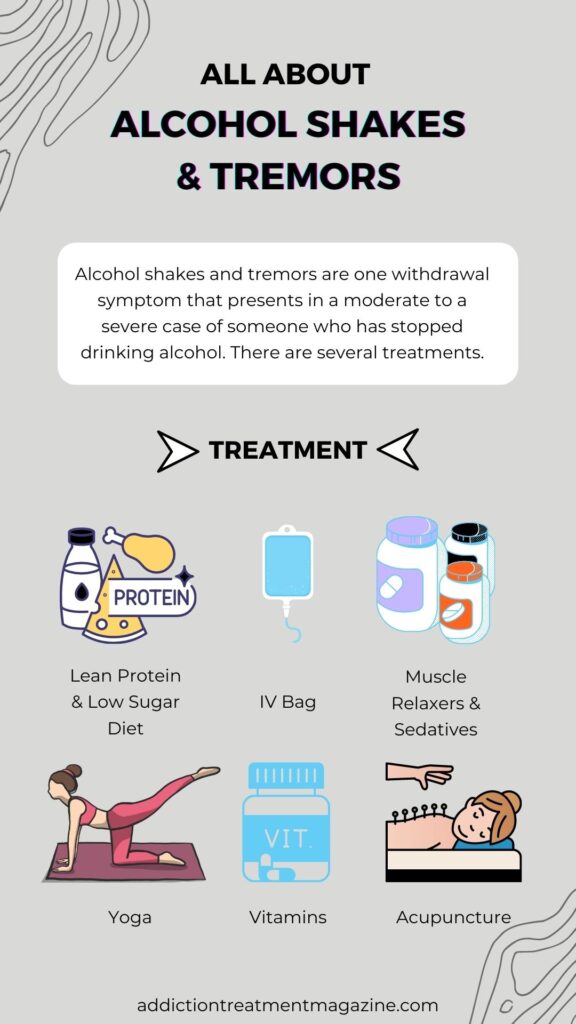Alcohol shakes and tremors are one withdrawal symptom that presents in a moderate to a severe case of someone who has stopped drinking alcohol. This is an obvious symptom that can be easily observed by the naked eye and the patient’s body with be physically be shaking as if they were in freezing temperatures without so much as a sweater. It is an involuntary movement that may present even when the individual is barely conscious at the time. Shakes and tremors can take over the whole body from head to toe, making it an uncomfortable, frustrating, and dangerous alcohol withdrawal symptom.
Precursors to Tremors
Alcohol withdrawal symptoms typically follow a certain timeline. If alcohol dependence has developed, some symptoms will present as early as 6 hours after the last alcoholic beverage consumed. These include irritability, anxiety, headaches, nausea, and vomiting. The presentations of these symptoms indicate that withdrawal has begun and it is important to stay vigilant for future symptoms. At this point, alcohol shakes and tremors may not be far behind. Although these are symptoms that will present even for a mild alcohol withdrawal case, they can be precursors to more severe symptoms. An alcohol detox program’s care team will observe the severity of these early symptoms to help prepare for potential future symptoms.
Symptoms That Accompany Shakes and Tremors
Someone who goes through moderate to severe alcohol withdrawal will experience worsening symptoms as they pass the 12-hour mark. Between 12 and 24 hours since their last drink the symptoms that present may include confusion, increased blood pressure, sweating, insomnia, and you guessed it: shaking and tremors.

Signaling Life-Threatening Symptoms
Just as earlier symptoms should always be observed closely for progression and to help predict worsening symptoms, shakes, tremors, and the associated symptoms need to be observed for the same reason. Someone who is experiencing severe and worsening tremors might continue to get worse between the 24 and 72-hour mark. These moderate to severe symptoms are precursors to a deadly condition referred to as Delirium Tremons. A patient who develops Delirium Tremons will experience extreme tremors, seizures, and hallucinations. Although only a small percentage of people who go through withdrawal develop Delirium Tremons, almost half of those who develop symptoms die. This is one of the main reasons why access to medical attention is critical for those who detox from alcohol.
What Causes Alcohol Shakes & Tremors
Tremors and shakes are not life-threatening. In fact, involuntary shaking is an example of a physiological function that in certain circumstances could save a life. For instance, an individual who is stuck outside during a cold night will likely start to shake uncontrollably. This shaking generates heat that might keep them alive. However, not all cases of shakes and tremors are as such.
Alcohol dependence is caused by changes in the anatomy and physiology of the brain, causing hormonal adjustments. During withdrawal, the hormones and neurotransmitters get thrown completely out of balance in a short period of time, and it takes a little while to adjust. These changes can present various symptoms. One of the areas of the brain that is affected is the area that controls the body’s muscles, causing uncontrollable shakes and tremors. Just as this area of the brain can be affected during detox, it can also be affected by excessive alcohol consumption.
Treating & Managing Alcohol Tremors
Although shakes and tremors themselves are not deadly, they can be debilitating and frankly embarrassing. How is someone supposed to drink from a cup or cut their food with a sharp knife when they can’t steady their hands? There are a number of ways in which this symptom can be managed and treated including:
- IV fluids
- Low sugar, high lean protein diet
- Vitamin supplements
- Yoga, meditation, & mindfulness
- Acupuncture
- Medication such as muscle relaxers or sedatives
When to Get Help
Ideally, get help at the very beginning of the detox process, before withdrawal symptoms have set in. This is particularly important for individuals who drink heavily on a daily basis. However, getting help at any point is better than not reaching out for help at all. The earlier in the process that an individual gets into a treatment facility, the more opportunities the medical professionals will have to treat and manage symptoms that develop. If you are ready to get sober, call today to talk to an admissions specialist.

